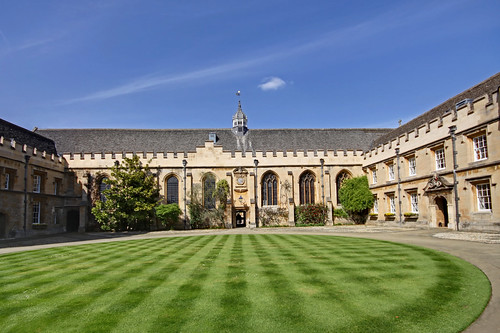Educational background
Ralph Hutchinson was a younger son of John Hutchinson of London. He was born in 1552 (?) and educated at Merchant Taylors' School. For the method of this school in teaching the Classics, see Lancelot Andrewes.
, Oxfordflickr.com
St John's College
Hutchinson then found his way to Oxford through the influence of Joan White (in her capacity as the widow of the founder of St. John's College, Oxford, Sir Thomas White). Concerned that his father, John Hutchinson, was ‘greatly charged with a great nombre of children’, Joan nominated Ralph in 1568 to a scholarship at the College. He was finally admitted two years later in 1570 (Stevenson and Salter, 164). Ralph graduated B.A. in 1575, and M.A. in 1578. In 1579 he was elected to the rhetoric readership, which he resigned in 1581 to become medical fellow. In June 1590 he was elected president of St John's College, by which time he had taken 'holy orders.' He became vicar of Charlbury, Oxfordshire, in 1593, and was also vicar of Cropthorne, Worcestershire. Further studies led to a BTh in 1596, and a Doctorate in 1602.Cropthorne, Worcestershire.
His Translation work
In 1604 Hutchinson was appointed one of the translators of the Authorized Version of the Bible, to work at Westminster with William Barlow and five others on the Greek version of the Pauline and other epistles, from Romans to Jude. We catch a glimpse of Hutchinson's activity in translating, through his correspondence with John Rainolds, where he discusses with Rainolds the false estimation in which a mutual acquaintance held certain Bible commentaries known to them:The commentaries . . . I can assure you to be mere empty names. For except those which are in the Venice Bible, let any man in Christendom show me so many as he speaketh upon the book of Esther, and I dare make myself his bondman.(1)Hutchinson could not have been one of the six translators mentioned by John Bois, who were officially engaged in revising the first draft of the Bible at Stationer's Hall, as it issued from the groups in the Universities and at Westminster. The official process of revision took place during most of 1609, and involved John Bois, , Andrew Downes and three others. However, although Hutchinson had died three years earlier, he may have had an influence on an initial revision process. Paine adds:
When Hutchinson died at the age of fifty-seven he left a few notes about phrases in the New Testament. John Bois used these, which still exist in copy. They show how early the most painful re-examination of the Bible text began, and how the final product came from joint efforts. (1)Hutchinson died on 16 January 1606 in Oxford, proud that his college had been ‘much blessed and increased duringe the tyme of [his] governement there’, and he was survived by nine children. As requested in his will, he was buried in the college chapel, where his widow (and executor) Mary placed a stone effigy in remembrance of his life and achievements. (3)
1. Paine, Gustavus, (1959/1977)The men behind the King James version, MI: Bakerpp. 74, 100
2. Shepard, Alexandra (2004) Oxford Dictionary of National Biography

